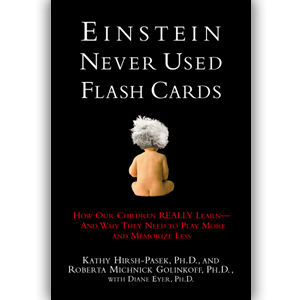 I have been wanting to read Einstein Never Used Flashcards by Kathy Hirsh-Pasek and Roberta Michnick Golinkoff for some time now. The baby-educating industry has become a huge market yet it contradicts everything I’ve learned over the course of my twenty-one years in education. Eager to find out more about the science of why parents should resist achievement in favor of fostering a love for learning, I began reading.
I have been wanting to read Einstein Never Used Flashcards by Kathy Hirsh-Pasek and Roberta Michnick Golinkoff for some time now. The baby-educating industry has become a huge market yet it contradicts everything I’ve learned over the course of my twenty-one years in education. Eager to find out more about the science of why parents should resist achievement in favor of fostering a love for learning, I began reading.
Although Einstein Never Used Flashcards is geared towards parents with young children, in our SOLs-obsessed state, the authors’ philosophy still applies to parents with older children, like me. Hirsh-Pasek and Golinkoff report, according to extensive research by the National Research Council of Institute of Medicine, “The key predictors of healthy intellectual and emotional development are ‘responsive, nurturing relationships with parents and caregivers’.” Therefore, the authors claim, the best way to grow smart kids is to simply take the time to enjoy them.
According to the research, engaging in purposeful, everyday activities is the best way to awaken your child’s intellect, Hirsh-Pasek and Golinkoff insist. Yet the authors report one survey shows that “65% of parents believe that flash cards are “very effective” in helping 2-year-olds develop their intellectual capacity.” Why is there a disconnect between the scientific research and parental opinion? Well, the authors explain the answer is two-fold. First, Hirsh-Pasek and Golinkoff claim, “Much of what the media reports about research on child development contains only a grain of scientific truth.” Second, the baby-educating toy industry, which the authors claim is now a billion dollar business, has managed to convince parents that parental architects can influence their children’s brains.
Hirsh-Pasek and Golinkoff argue that “the prevailing message is that it’s no longer sufficient for infants and toddlers to learn independently.” But in their chapter “Brainchild: How Children are Wired to Learn,” the authors explain why millions of years of evolution cannot be altered by parents in one generation. The reality is that “If children are growing up in normal, everyday environments filled with objects and buildings, with people who love then and talk to them, their brains will grow all by themselves. Parents are not the sculptors of their children’s brains, nor do they have the responsibility for deciding which particular sorts of experiences to provide to make synaptic connections happen within a critical period of time,” according to Hirsh-Pasek and Golinkoff.
Part of the reason, they conclude, many good parents have fallen victim to a bad myth is because we live in a roadrunner society. According to Hirsh-Pasek and Golinkoff, “Adults hear the message that getting more done faster is better and pass the pace right on down to their kids.” Surprisingly, “time-use studies show that the amount of time mothers spend with each child has barely changed over the last 50 years. What has changed is what parents typically do with their children during that time. Increasingly, it is ferrying them from one ‘enriching’ organized activity to another,” explain Hirsh-Pasek and Golinkoff.
These hectic schedules, argue the authors, gave rise to the notion of ‘quality time.’ However, Hirsh-Pasek and Golinkoff argue, “By making children dependent on others to schedule and entertain them, we deprive them of the pleasures of creating their own games and the sense of mastery and independence they will need to enjoy running their own lives.” Furthermore, the authors believe, parents rob themselves of one of the greatest joys in life – parenting.
So if you’re looking for some insights into why you should resist the temptation to create “young geniuses,” then read Einstein Never Used Flashcards. It won’t take long for Kathy Hirsh-Pasek and Roberta Michnick Golinkoff to convince you that doing so is the best way to equip you to raise happy, healthy, and intelligent children. Chapters include not only easy to understand scientific explanations but also “teachable moments” and sections where you can “discover hidden skills” in your children. Ultimately, Einstein Never Used Flashcards offers up an ideal New Year’s resolution for all those interested: reflect, resist, and re-center. This new parenting mantra will help you create the nurturing home life you need to raise children who love to learn.
Follow @WinterhalterV on Twitter for updates on blog posts or like Parenting by the Book on Facebook.
Read my other blog Befriending Forty.




